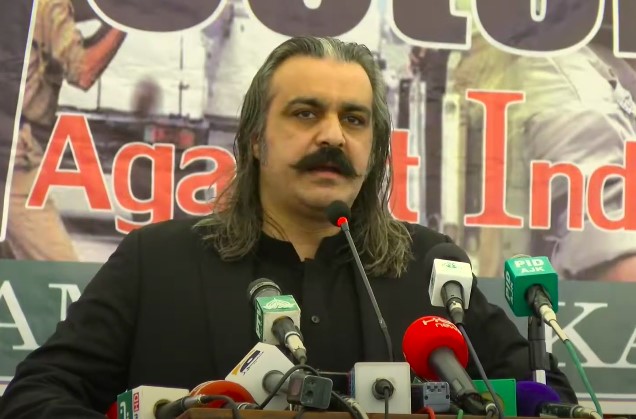Ali Amin Gandapur challenges the federal government’s intentions, calling for unity against unjust actions targeting the PTI
Khyber Pakhtunkhwa Chief Minister Ali Amin Gandapur strongly opposed the federal government’s recent attempts to ban the Pakistan Tehreek-e-Insaf (PTI), emphasizing that the party, which received the highest votes in the February 8 national elections, cannot be prohibited. Speaking at a press conference in Peshawar on July 17, Gandapur condemned the Pakistan Muslim League-Nawaz (PML-N)-led coalition government’s move, describing it as a catalyst for increased political turmoil.
Gandapur made his remarks following a security review for upcoming Muharram processions at the Supreme Command Post in Kohati Gate. He criticized the federal government’s actions, particularly the announcement by Federal Information Minister Ataullah Tarar regarding the proposed ban on PTI, stating it undermined the democratic process.
Embed from Getty ImagesHe highlighted the allegations that the current federal leadership came to power by undermining the people’s mandate. The government’s plans to file treason charges against top PTI leaders, including Imran Khan, Arif Alvi, and Qasim Suri, for their roles in dissolving the National Assembly in April 2022, further fueled his criticism.
In a significant turn of events, the Supreme Court recently upheld PTI’s eligibility for reserved seats for women and minorities, which Gandapur hailed as a vindication of the party’s stance. This ruling, he argued, underscored the legitimacy of PTI’s claims and highlighted the need for accountability from the Chief Election Commissioner, Sikander Sultan Raja.
Addressing the issue of judicial appointments, Gandapur expressed concern over the ad hoc nature of appointing judges to the Supreme Court. He insisted that such appointments should be merit-based, rather than temporary, and pledged to raise this issue in the provincial assembly.
On the matter of political dialogue, he stated that any discussions with ruling parties would be initiated by PTI’s founder, Imran Khan. Gandapur urged PTI’s political opponents to openly oppose any attempts to ban the party, calling their actions a political ploy designed to undermine democratic principles.
Analysis:
Political:
Gandapur’s firm stance against the proposed ban on PTI highlights the ongoing political friction in Pakistan. His remarks reflect a broader resistance within provincial leadership against perceived federal overreach. The situation indicates a deepening divide between the PML-N-led government and PTI, suggesting that the political landscape may become increasingly contentious.
Social:
The proposed ban and subsequent reactions reveal significant social implications, particularly regarding public trust in political institutions. Gandapur’s defense of PTI resonates with supporters who view the ban as an attack on democracy, suggesting a potential rallying point for civil society movements advocating for political rights.
Racial:
While the immediate focus is on party politics, underlying racial dynamics also play a role. The PTI’s stronghold in Khyber Pakhtunkhwa reflects regional identities that challenge the dominance of central political narratives, highlighting the need for inclusive governance that considers diverse community voices.
Gender:
The Supreme Court’s ruling on reserved seats for women and minorities points to ongoing gender issues within Pakistan’s political framework. Gandapur’s emphasis on this victory suggests an acknowledgment of the importance of gender representation, reflecting broader societal debates on women’s rights in politics.
Economic:
The political turmoil surrounding PTI could have significant economic consequences. Instability often leads to uncertainty in governance, impacting investor confidence and economic growth. Gandapur’s defence of PTI indicates an awareness of the economic implications tied to political actions and public perception.
